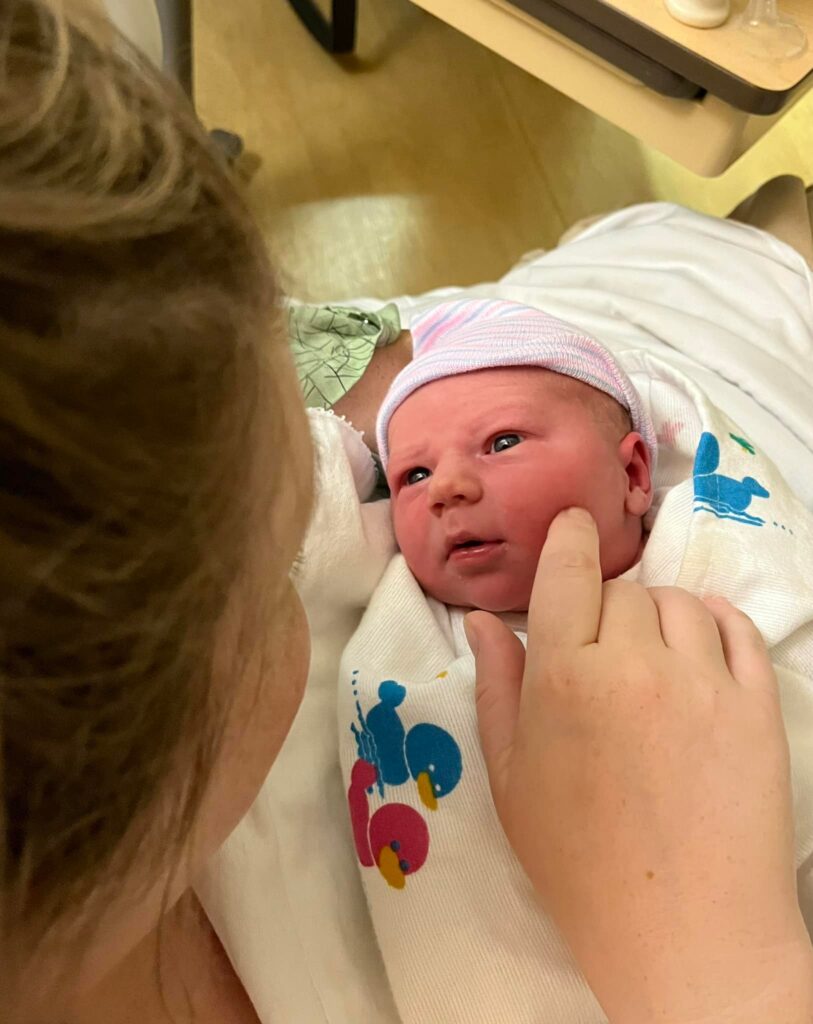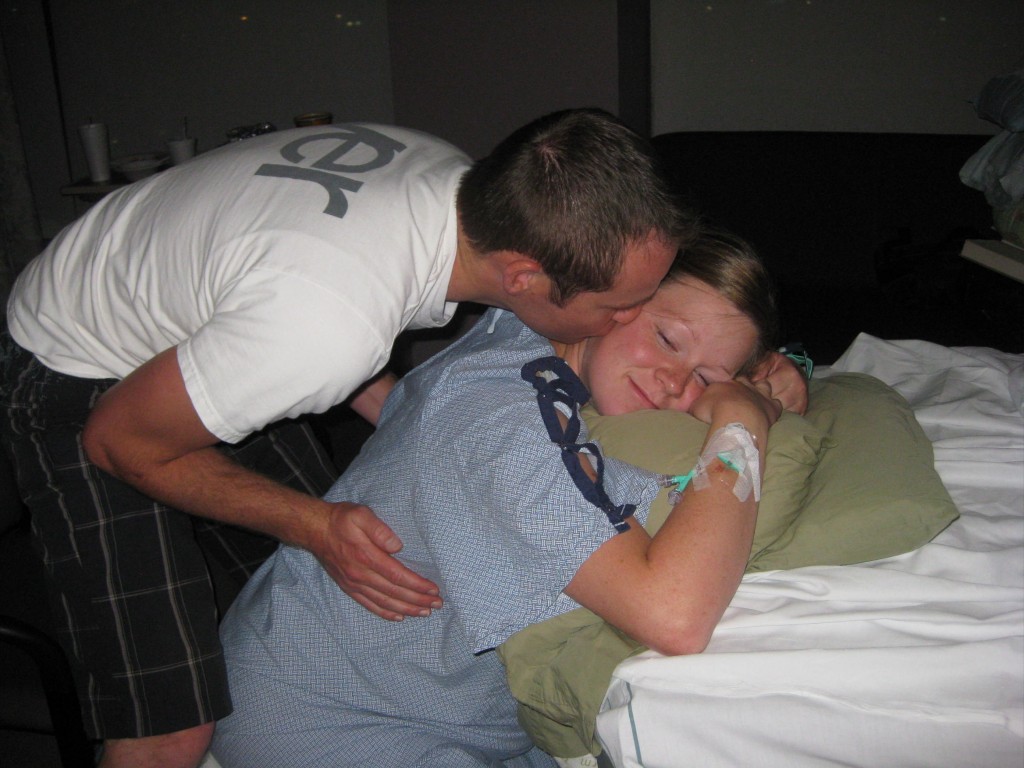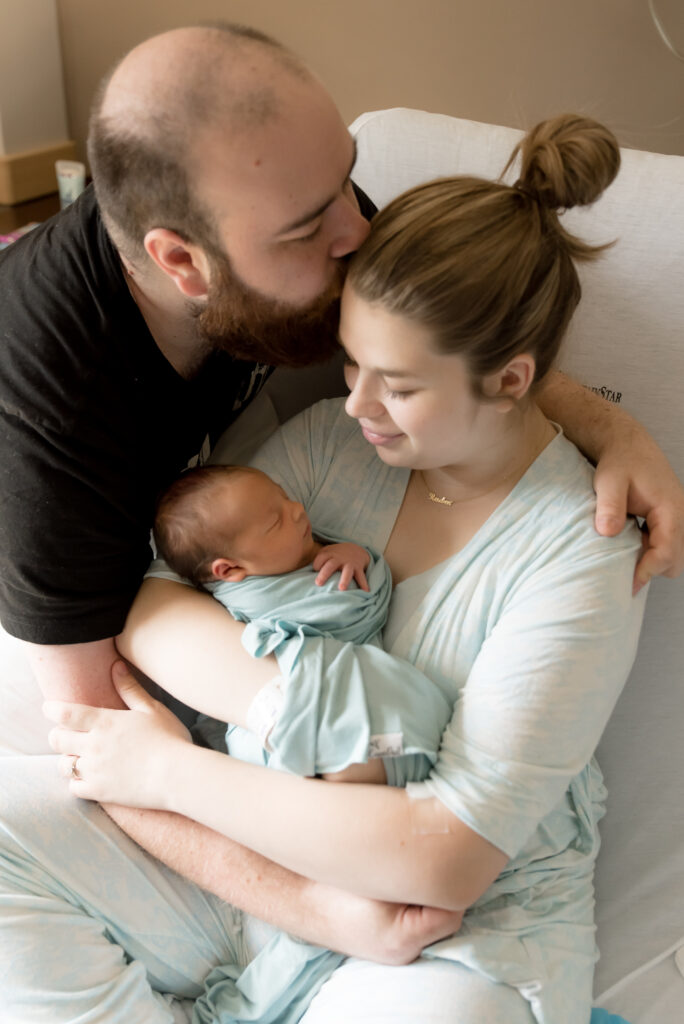Hypnobirthing Explained
by Stephanie T. Hodnett
Mike and I have seen lots of interesting reactions when we’ve mentioned Hypnobirthing (and I’m sure there were many more covered up by polite smiles). If you’re like me, you probably picture someone rhythmically swinging a pocket watch when you hear anything that starts with ‘hypno’. That was definitely my first mental image when some of my friends told me that they had done, or were planning on doing, Hypnobirthing to manage the discomforts of labor. Though I was a bit skeptical (I’ve always thought hypno-sorts of things were a crock), I was interested. How could someone fake a painless childbirth? I started reading the book.

It was a relief to learn that this ‘hypnosis’ was not the type you see in a stand-up routine at a comedy club. It’s more like losing track of time while reading a good book, or driving on auto-pilot, zoned out, but somehow still arriving at your destination without an accident. It’s a state of super relaxation where your body takes care of things without your mind having to consciously direct every action. This was still a little odd, but much less creepy than I had first imagined.

Hypnobirthing offers an alternative to the traditional pre-labor experience. Our Hypnobirthing classes explained the physical process of childbirth thoroughly, all the while emphasizing that childbirth is a natural function of a woman’s body and that, if left to itself, the body knows knows how to deliver a baby naturally and with minimal discomfort. We actually learned more about the actual process of birth from Hypnobirthing classes than we did from our Lamaze classes, which we took from a labor and delivery nurse at the hospital.

Some of the theories behind Hypnobirthing made a lot of sense to me. The “Fear-Tension-Pain Cycle” is a good example. Can you think of a time when you hurt yourself but carried on with what you were doing only to look down a little later and see blood? Suddenly, the injury that you hadn’t noticed gets really painful. When you realize you’ve been injured, you begin to fear the pain you know must accompany it. Fear makes your muscles tense, increasing any pain, and your mind begins to dwell on the fear and pain in a self-perpetuating cycle.

It doesn’t require a Hypnobirthing instructor to explain that our mental state affects our physical state, and our physical state affects our mental state. I know that my mind can convince my body that it’s sick, and it will actually get sick. Mike missed a few days of elementary school that way. One of the ideas behind Hypnobirthing is that if we condition our mind for a positive experience, we can actually make the physical experience more positive. That seems like a good idea, but it takes serious concerted effort and lots of practice. Our mind is conditioned by our experience, the experience of our friends and family, the things we’ve learned in school, what we see on the television, and everything else around us. Have you ever seen a laboring woman on TV who was calm or one who never screams and curses the father? Probably not. Most baby showers (not mine, thankfully) are filled with horror stories as guests try to “one up” each other with an even more awful childbirth experience. As the stories grow more dramatic and excruciating, the pregnant guest of honor becomes more tense and fearful. If you add up everything you’ve heard from family or friends, seen on television or in movies, and read in pregnancy books, you end up with some pretty negative mental conditioning. Our Hypnobirthing classes helped strip some of that negativity and turn it towards positive expectations. Was I still nervous? Of course. But I wasn’t terrified, and I was more excited than nervous.

In some parts of the globe, women go out and birth their babies without fanfare, weeping, or wailing. Is their anatomy so dramatically different than ours that what is excruciatingly painful for lots of Westerners is a walk in the park for them? Or are they just tougher than us and don’t complain as much? They probably are tougher, but I am convinced that a lot of the difference stems from the conditioning of our minds. In our society, we fear childbirth. We expect it to be agony, and spend the months before the actual experience conditioning our minds and bodies to expect it too. By the time the baby is due, we have trained our minds and bodies so well, that they react perfectly, as if they were being subjected to the most excruciating pain imaginable. The tension we build up in the expectation of pain helps create the pain, which increases tension and causes more pain. In places in the world where the expectation of pain is less severe, this cycle never begins, so the pain itself is less severe as well.

We also learned methods to actively divert and distract from the fear and tension that is likely to build during the childbirth process so that it didn’t become the painful experience it might have. For several weeks we practiced consciously relaxing each part of our bodies from head to toe, something akin to what’s recommended for people who sit at desks all day and have stressful jobs. We found it was not only a wonderful way to relax after a long day, it was also a great way to fall asleep. We practiced telling stories, so that our minds could be busy remembering places we had been together and things we had done. Since the mind can host only thought at a time, an engrossing story effectively blocks it from dwelling on discomfort or fear, letting the laboring woman’s body do what it naturally knows to do when it’s time to give birth. Labor doesn’t really require mental direction; the body has all the hormones in place to make the action happen without any help, and since the mental interference of a woman who is terrified is likely to increase tension and pain, the body probably works better when it’s left to do it’s own thing.

I don’t think the Hypnobirthing method is the one and only way to have a pleasant childbirth with minimal pain, nor do I agree with everything taught in Hypnobirthing, but I think the basic theory is good and the methods are useful. Mike and I feel it was well worth our time and money. We felt very confident. I trusted that my body knew what to do and was capable of doing it. Because we had educated ourselves, we were able to make informed decisions and take control of our birth experience. I would recommend Hypnobirthing to anyone. Even women who plan to have an epidural can learn from the ideas and methods of Hypnobirthing and benefit from the confidence that comes with better understanding. Every woman will have to make decisions about her own care and that of her baby, and will certainly want to be able to manage the discomforts of labor until pain medication is offered.






You must log in to post a comment.